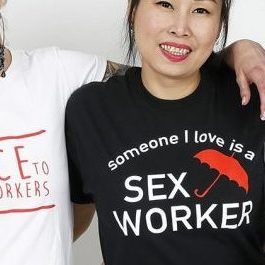
Could a queer sex worker’s personal crisis prove she was right all along?
“Sex workers are not allowed to have bad days,” Kitty Stryker says. Admitting to a bad day means bad PR, not just one person but also the whole profession. Putting a good face on things, keeping up appearances, is what’s important. It’s also impossible. “Sooner or later,” she says, “something has got to give.” For Stryker, something did.
Kitty Stryker is a former prostitute and porn performer. She’s also a blogger, a public speaker, an activist, and now a PR consultant. When we first spoke to her, in April of 2012, she seemed to have it all: Her profile was rising and she was beating the stigma of her night work to become a public figure. She had a fiancé, a girlfriend, and a supportive family. She seemed confident, secure, and happy.
Six months later, she’d quit her job and been dumped by all her significant others. For a moment, she’d contemplated suicide. “I packed a bag with all the medications I had and enough booze to sink a ship,” she later wrote. Subsequently, she was diagnosed with an anxiety disorder. It was a stunning turn. It was also inevitable—but not, Stryker contends, for the reasons some people think. In fact, to hear her tell it, those very assumptions about her confidence and happiness were the problem, to begin with.
With Stryker, image is everything. That’s how the name Kitty Stryker even came into being. “I decided on the seven-hour plane ride to California that I didn’t want to be Katie Fisher anymore,” she says of her exodus at the age of 19 from Massachusetts, where she’d grown up the child of liberal activists. “In California, nobody knew me, so I could become whoever I wanted. I wrote it all down on a piece of paper: ‘Here’s who Kitty Stryker is, here’s how she dresses, here’s what she does.’ ” Except for her grandmother (who still calls her Katie), there was nobody around to know the difference.
In 2003, the newly minted Stryker answered a Craigslist ad and became a pro-domme in San Francisco, a job she calls “fun.” After moving to London for a time, she branched out unequivocally into prostitution. In 2007, she began blogging about her work and promoting various social-justice issues for queers and women, even speaking at South by Southwest, appearing on CNN, and blogging for the Huffington Post. Her public image was founded on a single edict: that there is nothing inherently wrong with sex work, being queer, or being overweight. It was an effective argument, but it wasn’t the whole story.
“I was fiercely defending my choices while ignoring the problems in my personal life,” Stryker says. Her success became a problem in itself: The more effective an advocate she was, the less freedom she had. When she began to feel trapped in an abusive relationship, for example, she couldn’t speak out for fear that people would assume the abuse was related to sex work (even though her partner at the time had nothing to do with her job). Neither could she admit to having body-image issues for fear that people would assume they were because of her weight. Critics might pounce on any admission of vulnerability, and Stryker felt that people were counting on her not to give an inch.
“Even when I did complain, people just said, ‘But, you’re so strong.’ I would write about how amazing my relationship was, and even as I wrote it I knew it wasn’t true—but this was my public image and I needed to keep it up.” To be an effective advocate means having to be almost perfect. Any flaws can be exploited to discredit you. But ignore problems for too long and they’re bound to boil over. It’s a no-win situation that can trap queer-rights activists, feminists, and anyone else with an interest in changing the status quo. Even now, there are people who will roll their eyes at Stryker’s insistence that her crisis had nothing to do with her work; but Stryker doesn’t see it that way.
These days, Stryker markets herself as a consultant; when we last spoke, she was interviewing at Yahoo, and TROUBLEfilms had just hired her to head social media. She’d celebrated her 30th birthday in January. Change, she says, is always hard.
When I heard about Stryker’s problems, I found it hard not to feel naive for too readily believing in her outgoing public persona. But maybe the confident, dynamic, outspoken Stryker really was the genuine article; and maybe the vulnerable, uncertain, more fragile Stryker was the real thing, too. Maybe the problem with the world, in general, is our inability to accept that she might be the one while still remaining the other. (kittystryker.com)





